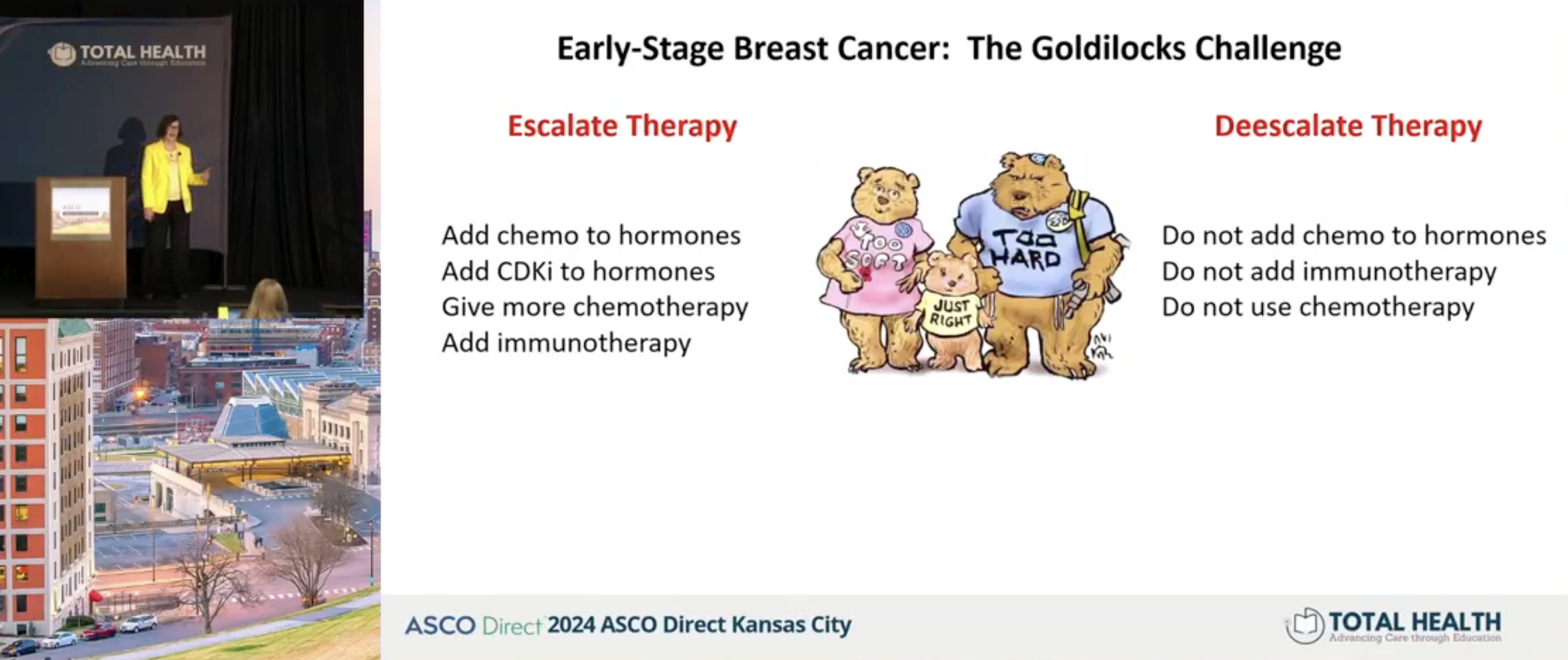ASCO Kansas City: Dr Lower Discusses the Importance of Defining Menopausal Status in the RxPonder Trial
Presenter:
Elyse E. Lower, MD, University of Cincinnati
Conference:
ASCO Direct™ Kansas City
The Bottom Line:
In the RxPonder trial of high risk, lymph node-positive early breast cancer patients, those with a genomic recurrence score less than 25 derived a benefit of adding chemotherapy to their adjuvant endocrine therapy only if they were premenopausal, but not if they were postmenopausal, which speaks to the importance of defining menopausal status in such patients. Further analysis from this trial suggests that menopausal status can be defined more accurately with the assessment of anti-Mullerian hormone, which could become an important new biomarker that needs to be assessed to better delineate treatment for patients who may be candidates for chemotherapy (in addition to endocrine therapy) as adjuvant treatment for early breast cancer.
Background:
The RxPonder Trial (also called SWOG S1007) examined outcomes in patients with hormone receptor positive (HR+), Human epidermal growth factor receptor 2 negative (HER2-) early breast cancer with 1 to 3 positive lymph nodes who were randomized to either chemotherapy with endocrine therapy (ET) or ET alone, if their recurrence score (RS), based on a genomic analysis of their biopsy sample, fell between the values of 0 and 25 (if the RS was > 25, patients were taken off study and received treatment with chemotherapy + ET). Previously reported results from RxPonder showed that those women who were “premenopausal” in the study (defined as having had a period within the last 6 months) did have a benefit of adding chemo to their ET, while those who were “postmenopausal” (defined as no period withing the last 6 months or having had their ovaries removed) did not have a benefit of adding chemo, as assessed by invasive disease-free survival (iDFS). There was also a much lower iDFS benefit for patients who were defined as “premenopausal” but who were 50 years of age or older, illustrating the importance of accurately defining menopausal status in relation to the type of adjuvant (post-surgical) treatment that should be offered. Anti-Mullerian hormone (AMH) is one of two markers of diminished ovarian function, and studies have shown that low levels of AMH may be a more definitive indicator of menopause relative to other markers such as estradiol (estrogen) and follicle stimulating hormone (FSH).
Key Findings:
Findings reported at this year’s American Society of Clinical Oncology (ASCO) Meeting examined the impact of adding chemo to ET in RxPonder in patients under 55 years of age, using AMH as well as other markers of menopause which can be readily assessed in blood samples, such as estradiol and FSH. Among the patients under 55 years of age in RxPonder whose serum was available for analysis, 1,032 were classified as “premenopausal” and 314 were classified as “postmenopausal”. Results from the analysis suggested that roughly 15% of patients defined as “premenopausal” in the trial actually had serum hormone levels consistent with postmenopausal status. In addition, 21% of patients < 55 years, defined as “premenopausal” in the trial had AMH levels in the postmenopausal range. Low AMH levels also correlated with age, such that about 3% of women in the under 45 age group had low AMH, whereas approximately 15% in the 45 to 49 age range and 50% of those in 50 to 54 age range, had low AMH levels. Dr Lower emphasized the significance of these findings in RxPonder, in that serum AMH levels in those women under age 55 could in fact significantly predict a benefit of adding chemotherapy to ET (P=0.019), while other markers like age (P=0.15) and estradiol levels (P=0.88) could not. Overall, among the under 55 years of age population in RxPonder, those with low AMH had no significant benefit in 5-year distant recurrence free survival (DRFS) while those with medium or high AMH levels had an approximately 8% improvement in DRFS at 5 years.
Conclusions and Faculty Insights:
Dr Lower noted that, if confirmed, these results can be potentially practice-changing for early breast cancer patients, in that those patients under 55 with HR+/HER2- early breast cancer and low AMH levels might be able to safely forgo chemotherapy in favor of ET alone. If confirmed in subsequent studies, these findings from RxPonder are particularly relevant if the patient’s menopausal status is not clear, and in this regard, she noted “we see a lot of these women in our patient populations.”
“Classifying menopausal status is tricky, tricky, tricky… This trial tells us that we don’t guess very well who is pre- and who is postmenopausal…”
Speaker Disclosure Information:
Dr Lower did not report any relevant disclosures for this presentation.

